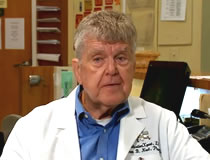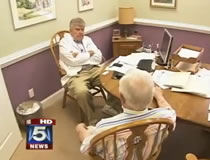December 31st, 2012
Managing Disruptive Doctors (or How to Handle a Spoiled Brat)
Managing Disruptive Doctors (or How to Handle a Spoiled Brat)
December 31, 2012
The other day I received a mailing from a health care training group for a $279 continuing-education seminar titled “Managing Disruptive Docs in a New Era of Hospital-Physician Relations.” The topic may sound absurd, but this is a real problem in medical care. Many physicians seem as if they were taught in medical school how to be impossible to work with. Now, some of it may be natural, as most people bow down to doctors and hang on every word they say. Well, if you are treated like God all the time, then you get to feeling like God and act accordingly. This comes from the time when the physicians were the most educated professionals in a community and everyone looked up to them as authority figures. But times have changed, and today there are many people in the community who have equal or more education and more training in their field of health care.
I’ve said many times that physicians want to hold on to the practice of medicine as it was in the 1940s. Well, this is the 21st century. Their training is in the diagnosis and treatment of disease. Clinical pharmacists know so much more about the drugs and drug therapy as it relates to patient physiology that they should be in total control of the management of the patient’s drug therapy. This also holds true for physical therapist, dietitians, occupational therapists, respiratory therapists and many of the other highly trained specialists who work with patients. The average physician has little or no training in these areas yet retains total and ultimate control over whether to order or not order essential services. This is a major problem in providing good patient care, as it’s costing the health care system many unnecessary dollars as well as causing pain, suffering, and deaths.
One of the statements in the brochure I received — “Our top experts will show you early intervention techniques and a range of effective resources that can help you reduce behavioral problems, retain star physicians, create a healthier workplace and save millions in potential lawsuits” — illuminates the problem. As I see it, though, the spoiled brat just needs to grow up or get out of the way.
A few years back, we were running pharmacokinetics studies on a new drug that called for us to take blood samples every four hours and record the concentration in the blood 30 minutes before the next injection and two hours after the injection to develop a graph of administration, metabolism, and half life. We would record the times from the nurse’s documentation in the health record, but when we put them in a graph the figures were, inexplicably, all over the chart. Then I began to wonder whether the nurse was just charting as the injections as they’d been ordered. So I set up a separate notebook and told the nurse that while she could chart any way she wanted to in the patient’s medical record, for this certain drug I needed to know exactly when it was administered and exactly when the blood was drawn. Lo and behold, the values on the graph started lining up exactly, and we were able to finish our study with completely accurate information. It was disappointing to see that the patient’s medical record didn’t really reflect reality, but you can understand that if the nurse hadn’t done it that way for the doctor to see, the physician would go ballistic and all hell would break loose.
I also remember back when we started placing our suggestions for drug therapy, a newly federal mandated task, into the patient’s health record. The physicians became enraged and would say something along these lines: “ This is my record, and I don’t like to have anyone question me or my actions, and I want it stopped immediately.” I’ve had physicians take my suggestions out of the patient’s medical record and tear them up and throw them on the floor. I’ve even seen physicians get mad, sling the medical record across the nursing station, turn over the chair, and storm out of the nursing home.
Now please understand I do have the pleasure of working with some wonderful physicians who have lots of compassion and expertise in caring for patients. I cannot describe how much excitement and inspired I can get when we all work as a team devoid of all egos, jealousies and turf protection and put the patient first and then stand back and observe the results of our talents as the patient responds to our work. I can tell you that it is these situations, which happen often, that make you move on and continue to try and break down the brick wall of resentment seen with the disruptive doctors.
Another topic in the seminar — “Economic consequences of disruptive behavior” — also struck a responsive chord. Every day I think about the costs of unnecessary tests on a patient arising from drug effects and not the disease state just because a physician wouldn’t listen to anyone else’s advice. Many patients are hospitalized because the physician refuses to follow the pharmacist’s drug therapy management suggestions; some even die unnecessarily. Nursing home administrators who once didn’t want anyone to ruffle the feathers of the doctor now were standing their ground since the cost of these disruptive episodes cost their facilities money and led to an exodus of excellent employees who refused to work with an impossible doctor. Instead of trying to tiptoe around a problem physician, why not just kick him off the team? The best approach, in my judgment, is to get a physician who is not insecure and scared of losing his place on the pedestal, one who enjoys the team approach, one who welcomes the help of other specialists in making a care plan that meets the patient’s needs and squeezes out every possible ounce of quality of life for the patient. That’s what makes for great patient care.
Although there are a lot of “disruptive doctors” out there, I bet the number would drop dramatically if nursing home administrators began kicking them off their staffs and refusing to tolerate any type of disruptive behavior. And outside of the institutional setting, patients need to take command of their own health care by firing that arrogant, hard-to-get-along-with doctor and finding one who will work with others for their benefit.
If these two things happened, you wouldn’t need a $279 seminar on how to deal with disruptive docs.
- September 23rd, 2012
FDA Reviews Possible Mirapex Heart RiskRead - December 14th, 2012
Survey: Poor mental health care keeping seniors at riskRead - November 19th, 2012
Advair: How Safe Is This Drug ???Read - September 21st, 2014
Antibiotic Recall Due to Particulate MatterRead - August 18th, 2012
What would you do if you saw someone collapse?Read
Geriatric Nutrition
Without good nutrition, positive drug therapy outcomes are very difficult to obtain, For the best in Geriatric Nutritional Information
Find out more Optima SolutionsContinuing Education
Each month we will post an analysis of specific aspects of government long-term healthcare regulations.
Find out more


